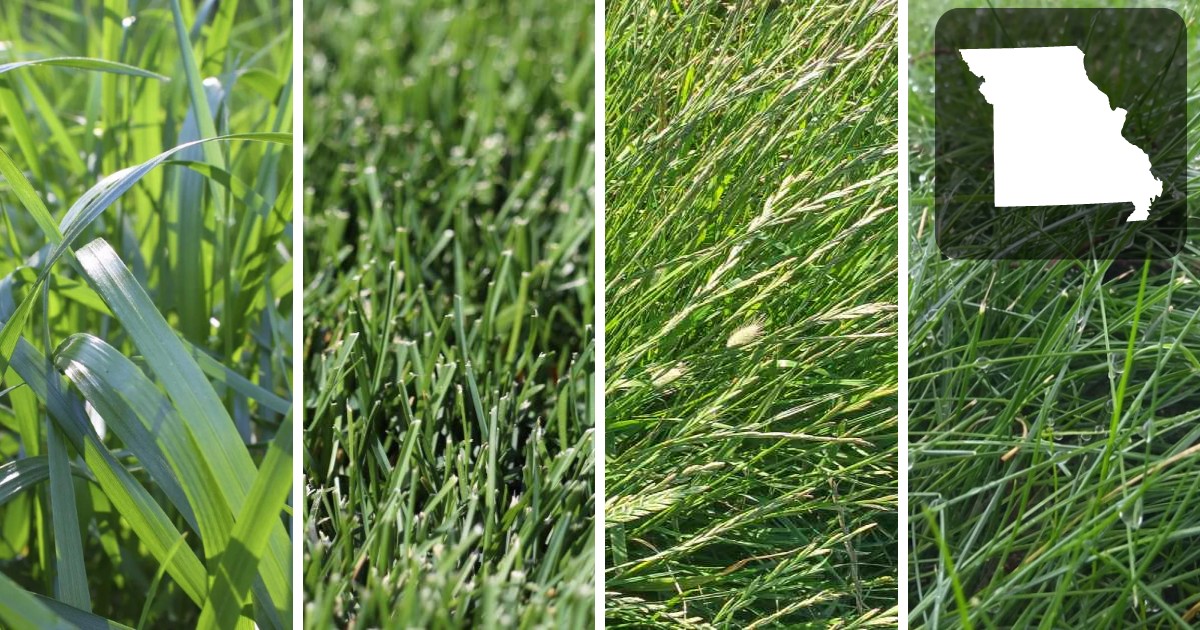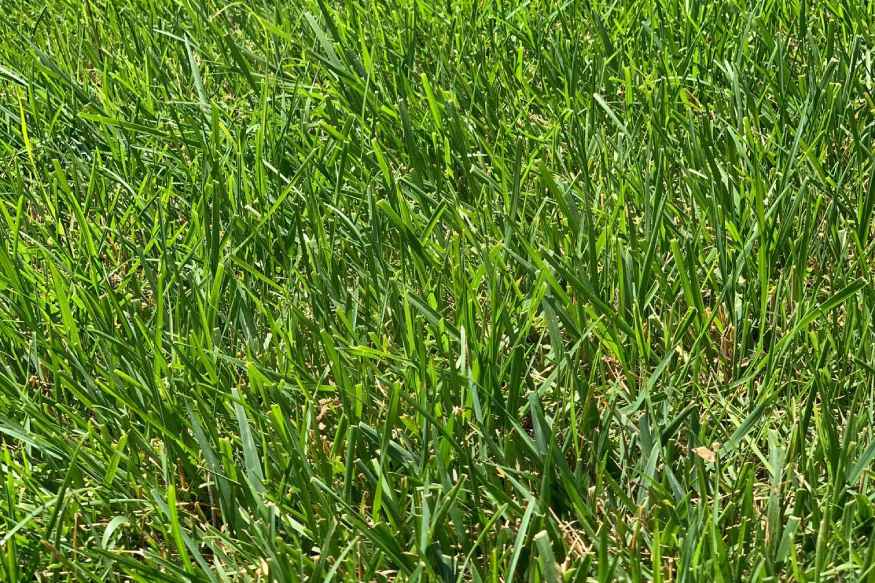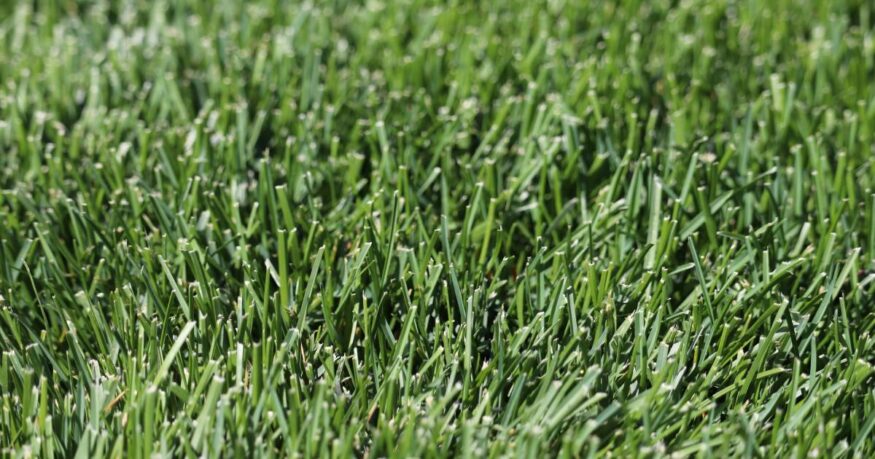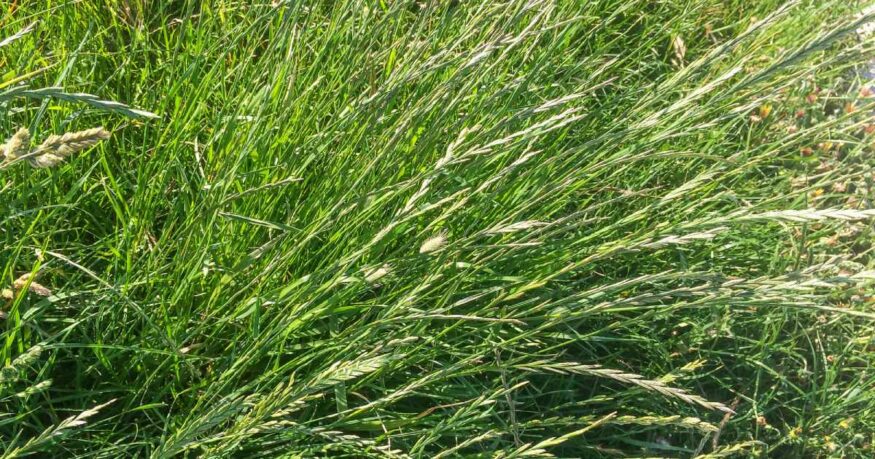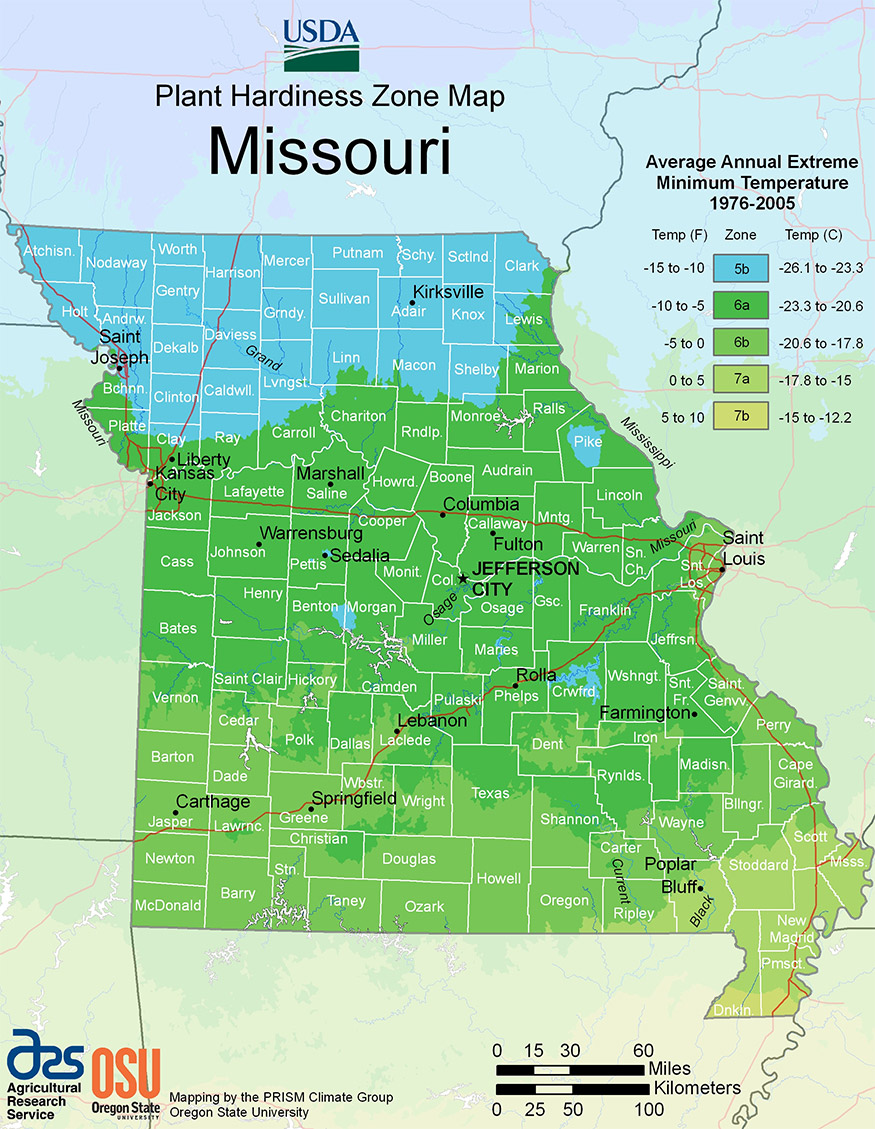Growing a lawn in Missouri can be a challenge, thanks to the state’s unpredictable climate and diverse soil types. Missouri’s hot and humid summers and cold and dry winters can make it difficult to keep grass healthy and green. Additionally, the state’s varying soil types, which range from heavy clay to sandy loam, can make it challenging to find the right grass seed that will thrive in your specific soil conditions.
Quick answer: Tall Fescue is an excellent option that’s known for its adaptability and low maintenance. But, as with any type of lawn care, it depends on your lawn’s unique requirements and conditions.
In this article, we’ll take a closer look at the challenges of growing a lawn in Missouri and explore some other great grass seed options to help you create the perfect lawn for your home or business.
Tall Fescue
| Also Known As | Lolium arundinaceum (formerly Festuca arundinacea) |
| Type of Grass | Cool season perennial |
| Optimal Zones | Northern through transition zones |
| Root Structure | Deep |
| Winter hardiness | Excellent |
| Shade tolerance | High |
| Water Requirements | Medium to High |
| Drought Tolerance | Excellent |
| Self Repair Capacity | Limited |
| Overall Maintenance Requirements | Low |
Why Tall Fescue is a Good Choice For Missouri Lawns
Tall fescue grass is a top-performing turf option for Missouri lawns. Known for its adaptability, this grass type boasts superior heat and drought tolerance and deep green coloring, making it an excellent general-purpose turfgrass for the region. Unlike other grasses, tall fescue is a bunch-type growth that does not spread rapidly, so reseeding is necessary to repair damage and thin spots.
The University of Missouri says “Tall fescue is well adapted to the soil and weather conditions of Missouri. It is especially adapted to the hazardous growing conditions of southern Missouri and will produce more forage on acid, wet soils of sandstone and shale origin than other cool-season grass.”
This durable grass is valued for its deep root system, which makes it a resilient choice for drought-prone areas. With a seeding rate of 7 to 10 pounds per 1,000 sq. ft, tall fescue can be successfully grown in all parts of Missouri, resisting heavy wear and high temperatures with ease. This grass type is also known for its tolerance to cold, heat, drought, and shade, and its disease-resistant qualities.
Due to its impressive heat tolerance, tall fescue is a great choice for the transitional zone in Missouri. It can remain green year-round in some climates, and its limited capacity for self-repair makes it an ideal choice for homeowners looking for a low-maintenance lawn option.
So, whether you’re looking for a lawn that will withstand heavy foot traffic, drought, or extreme temperatures, tall fescue grass may be just what you need to achieve a beautiful and resilient lawn in Missouri.
Looking for the best grass seed for your region?
Our smart lawn plans are designed to work perfectly with your local soil and climate conditions, without any of the toxic stuff.
Use the code EHG20 for an instant $20 discount!
- Personalized lawn care: Custom lawn plans based on soil analysis, climate data, and your specific lawn needs.
- Convenience with a conscience: Products that are not only easy to use but also safe for you, your pets, and the planet.
- Science-backed formulas: Bio-based formulas contain effective, natural ingredients like seaweed, molasses, and iron.
- Expert support: Get one-on-one guidance from a real person and rest easy with Sunday's satisfaction guarantee.
Kentucky Bluegrass
| Also Known As | Poa pratensis L. |
| Type of Grass | Cool season perennial |
| Optimal Zones | Northern cool season zone, transition zones |
| Root Structure | Shallow |
| Winter hardiness | Excellent |
| Shade tolerance | Poor to Good |
| Water Requirements | High |
| Drought Tolerance | Poor |
| Self Repair Capacity | Excellent |
| Overall Maintenance Requirements | High |
Why Kentucky Bluegrass Grows Well in Missouri
Kentucky bluegrass is a popular choice for lawns, athletic fields, golf courses, and public areas across the country. This cool-season turf type is characterized by its ability to withstand moderate foot traffic, excellent drought tolerance, and adaptability to both moderate shade and full sun.
Kentucky bluegrass thrives in cooler parts of Missouri, where it can be used in mixtures with perennial ryegrass and/or tall fescue for athletic fields.
The University of Missouri says: “Kentucky bluegrass, Poa pratensis, is the most predominant pasture grass in the northern half of Missouri. It is adapted to well-drained loams and heavier soil types of medium and better productivity.”
The rhizomes of Kentucky bluegrass enable it to spread and recover quickly from wear injury, making it an ideal option for high-traffic areas. However, it requires a moderate amount of maintenance and regular watering during the summer months to keep the grass lush and green. Despite its shallow roots, Kentucky bluegrass is known for its density, durability, and lush appearance, making it a top choice for homeowners in the Midwest.
Kentucky bluegrass flourishes in full sun areas, making it a great option for lawns and other outdoor spaces.
If starting a new lawn from seed, regular and light watering for the first month is crucial for good germination and establishment.
Overall, Kentucky bluegrass is an excellent choice for homeowners in transitional climate zones like Missouri. With its ability to spread quickly and recover from damage, this turf type is both beautiful and durable, providing an ideal solution for a wide range of outdoor spaces.
Perennial Ryegrass
| Also Known As | Lolium perenne L. |
| Type of Grass | Cool season perennial |
| Optimal Zones | Mild northern zones |
| Root Structure | Deep |
| Winter hardiness | Good to excellent |
| Shade tolerance | Moderate |
| Water Requirements | High |
| Drought Tolerance | Good |
| Self Repair Capacity | Excellent wear tolerance |
| Overall Maintenance Requirements | Moderate to high |
Why Perennial Ryegrass is a good choice for Missouri
If you’re looking to establish a lush lawn quickly with minimal maintenance, perennial ryegrass is a great option for Missouri homeowners.
With its vibrant light green hue and resistance to insects and disease, this variety germinates quickly and can withstand heavy foot traffic.
However, it grows in large clumps and requires thorough and even seeding to ensure even growth.
Perennial ryegrass is fibrous, giving it moderate resistance to drought and heat, making it ideal for warm seasons with shallow roots. Regular watering is essential, particularly during the morning or evening when sunlight is minimal, to ensure deep root growth. This turf type blends well with other grasses and is a great choice for overseeding dormant bermudagrass in the fall.
While perennial ryegrass is a fast-growing and hardy turf type, it requires a sharp mower blade to avoid shredding or tearing the grass. Depending on where you live and your lawn goals, this grass type may be an excellent choice for a beautiful and resilient lawn in Missouri.
Fine Fescue
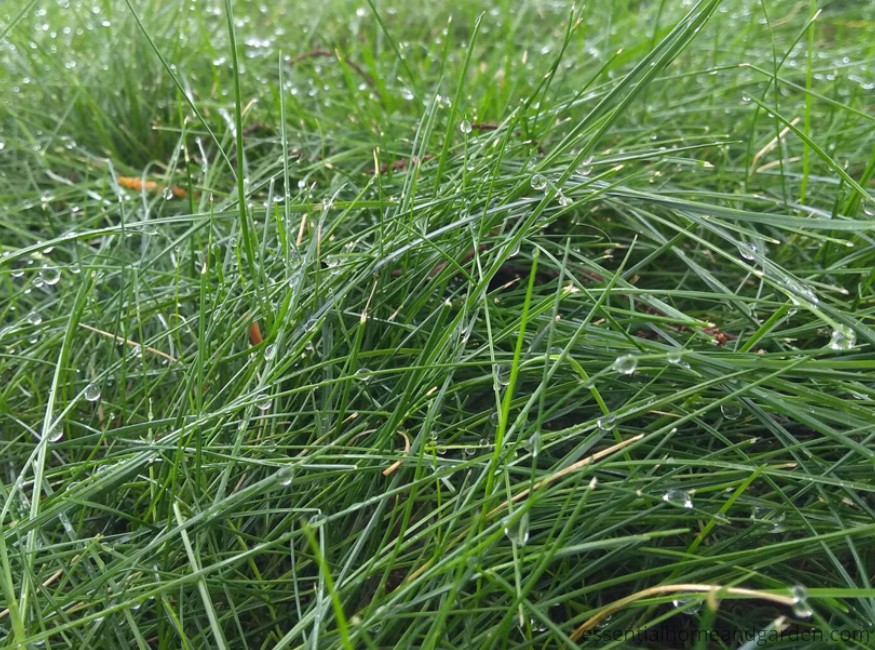
| Also Known As | Hard fescue, strong creeping red fescue, slender creeping red fescue, sheep fescue, chewings fescue; Festuca L. |
| Type of Grass | Cool season perennial |
| Optimal Zones | Northern zones |
| Root Structure | Medium |
| Winter hardiness | Excellent |
| Shade tolerance | Excellent |
| Water Requirements | Medium to High |
| Drought Tolerance | Excellent |
| Self Repair Capacity | Limited |
| Overall Maintenance Requirements | Low |
Why You Should Consider Fine Fescue
When it comes to fine fescue, it’s a collective term used to describe various grasses with thin, needle-like leaves. They are best suited for midwestern and coastal regions with moderately humid, cool conditions. In Missouri, fine fescue is a good option for areas that are too shady for other cool-season grasses.
Fine Fescue also has great shade tolerance, fine texture, and low maintenance requirements. Fine fescue has a medium to dark green color and is known for being easy to grow, having the finest leaves, and tolerating infrequent mowing.
While the fine fescue variety includes chewings, hard, sheep, and creeping red, they all share some common traits including shade tolerance, low fertilizer and mowing requirements, and fine texture. They also tolerate sandy soil and dry weather conditions, and are ideal for cool, humid climates. However, fine fescue has a relatively low foot traffic tolerance and is not recommended for sports fields.
Fine fescue is often used in public landscape areas like roadsides and parks, and is extensively used in grass seed blends and mixes for both sunny and shady areas. In terms of maintenance, fine fescue requires little fertilizer and is mowed at 1 1/2 to 2 1/2 inches. It’s soft to walk on barefoot and has moderate to high salt tolerance, making it great for areas where road salts are a concern.
Although fine fescue has some limitations, including low heat tolerance and susceptibility to certain diseases, its moderate to high shade tolerance, soft texture, and low maintenance requirements make it a great choice for homeowners in Missouri looking for a beautiful, low-maintenance lawn option.
Missouri’s Climate And Growing Challenges For Lawns
Missouri is known for its humid continental climate, which means that the summers are hot and humid, while the winters are cold and snowy. This climate can pose some challenges for homeowners looking to grow a healthy and lush lawn.
In addition to the climate, the soil conditions and other factors can also affect the growth and maintenance of lawns in the state.
Northern Missouri, with its cooler temperatures, finds Kentucky Bluegrass thriving, especially in the counties of Platte, Clay, and Boone.
In contrast, the southern regions like Ozark, Taney, and Howell counties, with their warmer climates, see a predominance of Bermuda Grass.
Soil Conditions
One of the biggest challenges for homeowners in Missouri is the soil conditions. The state’s soil is known for its high clay content, which can make it difficult for grass to grow and thrive. Clay soil tends to compact easily, making it hard for water and nutrients to penetrate the roots of the grass.
The clayey soils of central Missouri, particularly in areas around Jefferson City, are well-suited for Tall Fescue.
The sandy loams of the Mississippi River plains in eastern Missouri are ideal for Perennial Ryegrass.
Droughts and Rainfall
Another challenge for homeowners in Missouri is the occasional drought conditions. During the hot and dry summer months, it can be challenging to keep lawns healthy and green without adequate irrigation. Drought can cause stress on lawns, making them more susceptible to disease and pests.
Given the higher annual rainfall in western Missouri, grasses like Fine Fescue that prefer moist conditions would be a suitable choice for regions like Jackson, Cass, and Bates counties.
The drier conditions of eastern Missouri might favor drought-resistant grasses such as Zoysia.
Heat and Humidity
Missouri’s hot and humid summers can also be challenging for lawns. High temperatures and humidity can lead to stress on the grass, causing it to turn brown and go dormant. This stress can also make lawns more susceptible to pests and disease.
Grass Types and Land Features in Missouri
The layout of Missouri has rolling hills, flat lands, and high zones. Each needs a special approach for lawn care. The key to a lush lawn depends on matching the right grass to the land’s nature.
In the Ozark area in the south, the weather is cool. Cool-season grasses grow well here. Grass like Bluegrass and Fine Fescue do well in these heights. They offer a rich green base for the mountain view.
On the other hand, the flat lands to the north have a steady climate. This suits grass types that like stable conditions. Bluegrass does very well here. It spreads fast, makes dense turf and its roots hold the soil firm.
Weeds
Finally, weeds can be a significant challenge for homeowners in Missouri. The state’s humid climate provides ideal conditions for weed growth, and it can be difficult to keep them at bay without the use of chemicals.
Despite these challenges, with the right care and maintenance, it is possible to grow a healthy and lush lawn in Missouri.
Homeowners should choose grass varieties that are well-suited to the state’s climate and soil conditions, and they should be diligent in their watering, fertilizing, and mowing practices. By taking these steps, homeowners can enjoy a beautiful and vibrant lawn year-round.
Missouri’s Grass Triumphs: Local Lawn Success Stories
Missouri, with its diverse climate and topography, presents a myriad of challenges for lawn enthusiasts. However, with the right grass selection and care, many have turned these challenges into success stories.
Here are a couple of notable examples:
Kirksville’s Resilient Blend
In the quaint town of Kirksville, a dedicated homeowner decided to experiment with a blend of Kentucky Bluegrass and Perennial Ryegrass.
The result? A lawn that not only thrived but also gracefully withstood the town’s fluctuating spring temperatures.
This blend showcased the power of combining grass types to achieve a lawn that’s both robust and aesthetically pleasing.
Cape Girardeau’s Bermuda Grass Showcase
Down south in Cape Girardeau, a community park became the talk of the town, not just for its recreational facilities but for its vibrant green cover.
The park’s management chose Bermuda Grass, known for its resilience during hot summers. As temperatures soared, the Bermuda Grass stood tall, becoming a model for surrounding neighborhoods and inspiring many to adopt this hardy grass type for their lawns.
Looking for the best grass seed for your region?
Our smart lawn plans are designed to work perfectly with your local soil and climate conditions, without any of the toxic stuff.
Use the code EHG20 for an instant $20 discount!
- Personalized lawn care: Custom lawn plans based on soil analysis, climate data, and your specific lawn needs.
- Convenience with a conscience: Products that are not only easy to use but also safe for you, your pets, and the planet.
- Science-backed formulas: Bio-based formulas contain effective, natural ingredients like seaweed, molasses, and iron.
- Expert support: Get one-on-one guidance from a real person and rest easy with Sunday's satisfaction guarantee.
